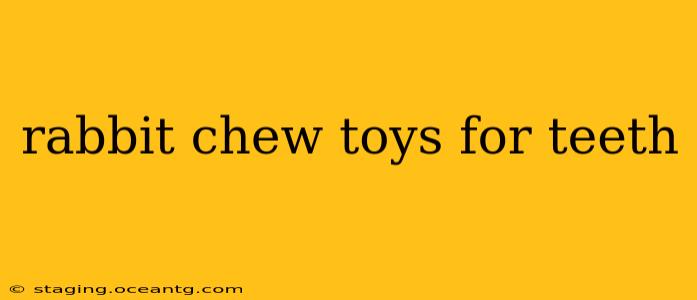Keeping your bunny's teeth healthy is crucial for their overall well-being. Rabbits' teeth are constantly growing, and without proper chewing, they can develop painful overgrowth, leading to serious health issues. Providing a variety of appropriate chew toys is essential for preventing dental problems and ensuring your furry friend remains happy and healthy. This guide explores the best rabbit chew toys for teeth, addressing common concerns and offering valuable insights for responsible bunny ownership.
What are the Best Materials for Rabbit Chew Toys?
Choosing the right materials is key when selecting chew toys for your rabbit. Avoid anything toxic or that could easily splinter, posing a choking hazard. Here are some excellent options:
-
Hay: This is the cornerstone of a rabbit's diet and an excellent natural chew toy. Unlimited access to hay helps wear down their teeth naturally. Different types of hay, like Timothy hay, orchard grass, and oat hay, offer varying textures to keep things interesting.
-
Wood: Untreated, safe wood is a good choice. Look for toys made from applewood, willow, or birch, ensuring they are free from pesticides and paints. Avoid softwoods like pine or cedar, as these can be toxic.
-
Grass: Similar to hay, grass offers a natural and healthy chewing option. Fresh grass (ensure it's pesticide-free!) can be a welcome treat alongside their regular hay.
-
Vegetable-based materials: Some toys are made from compressed vegetable matter, providing a tasty and durable chewing experience. However, always supervise your bunny to ensure they aren't consuming excessive amounts.
-
Hard cardboard: Recycled cardboard tubes, free from any ink or glue residue, can provide a fun and safe chewing alternative. Supervise your rabbit to prevent ingestion of large pieces.
What Types of Rabbit Chew Toys are Best for Teeth?
Variety is key to keeping your bunny engaged and preventing dental issues. Offer a range of textures and shapes to stimulate different chewing actions:
-
Hay feeders: These dispensers encourage your rabbit to forage and work for their food, providing extra chewing opportunities.
-
Wooden chew blocks: These come in various shapes and sizes, providing a satisfying and durable chewing experience.
-
Root vegetables: Carrots, celery, and parsley roots can be excellent additions to their diet and offer natural chewing options. However, these should be offered in moderation.
How Often Should I Replace My Rabbit's Chew Toys?
Regular replacement is essential. As your rabbit chews, the toys will naturally wear down. Inspect the toys regularly for signs of damage, splintering, or excessive wear. Replace them as needed to prevent your rabbit from ingesting potentially harmful pieces. Aim to replace toys every few weeks, or sooner if they are showing significant wear.
What Should I Avoid Giving My Rabbit to Chew On?
Several materials are dangerous for rabbits and should be avoided:
-
Plastic: Plastic toys can easily break, resulting in sharp edges or ingestion of small pieces.
-
Treated wood: Woods treated with chemicals or paints are highly toxic.
-
Rubber: Rubber toys are not digestible and can cause digestive issues.
-
Fabric: Soft fabrics can easily be ingested, leading to blockages.
Are there any DIY Rabbit Chew Toys I can Make?
Yes, you can make safe and engaging chew toys at home. Supervision is always key. Simple options include tightly packed hay balls, braided hay, or small, untreated wooden blocks. Always ensure these are safe and free of hazards.
My Rabbit Won't Chew on Their Toys, What Should I Do?
If your rabbit isn't interested in their chew toys, try the following:
- Introduce new toys regularly: Variety is key to keeping your bunny interested.
- Offer different textures: Experiment with various materials and shapes.
- Supervise and interact: Show your rabbit how to use the toys by demonstrating chewing behavior.
- Check for underlying health issues: If your rabbit shows a persistent lack of interest in chewing, consult a veterinarian.
By providing your rabbit with a variety of appropriate chew toys and maintaining a balanced diet rich in hay, you can significantly reduce the risk of dental problems and ensure your fluffy friend enjoys a long and healthy life. Remember to always monitor your rabbit while they are playing with their chew toys and replace them as needed.
